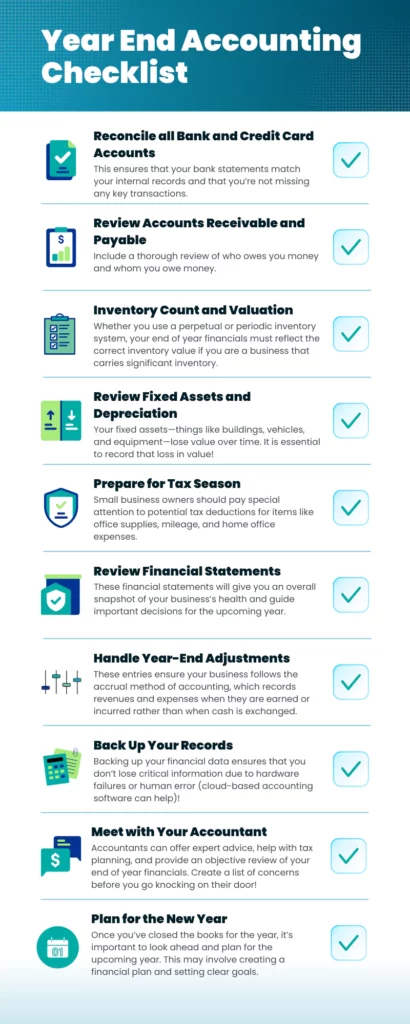Year-End Accounting Checklist: Key Steps to Close Your Books

Understanding Consistent Financial Reporting for Small Businesses
September 13, 2024
How to Save with Turo Auto-Tax Deductions: A Step-by-Step Guide for Hosts
September 27, 2024As the year draws to a close, business owners and finance teams face the exhausting task of wrapping up their financial records. Closing out your books properly doesn’t just consist of following protocol—it’s supposed to focus on ensuring your business starts the new year on a strong financial footing. A well-executed year-end accounting checklist can help you tackle this process efficiently and avoid future headaches.
In this guide, we’ll break down key steps you need to close your books, giving you a thorough year-end bookkeeping checklist. Whether you’re a seasoned accountant or a small business owner handling your own finances, this checklist will help you breeze through the end of year financials with confidence.
1. Reconcile All Bank and Credit Card Accounts
Why It Matters: Reconciling your accounts is one of the first steps that should exist in any year-end checklist for accounting. It ensures that your bank statements match your internal records and that you’re not missing any key transactions.
How to Do It:
- Compare your bank and credit card statements with your internal bookkeeping records.
- Identify any discrepancies, such as missing or duplicate transactions.
- Correct these discrepancies before proceeding.
Pro Tip: Use accounting software to automatically pull in your bank statements for a more efficient reconciliation process.
Having a clean reconciliation not only makes tax season easier but also gives you a better idea of your cash flow.
2. Review Accounts Receivable and Payable
Why It Matters: To maintain accuracy through your year-end accounting checklist you must include a thorough review of who owes you money and whom you owe money. This ensures that your books reflect the true financial position of your business.
How to Do It:
- Go through your accounts receivable (AR) to check any outstanding invoices. Reach out to clients to collect on overdue payments.
- Review accounts payable (AP) to ensure you’ve recorded all your liabilities. Check if there are any bills you’ve missed or need to follow up on.
Pro Tip: This is also an excellent time to evaluate your accounts receivable turnover rate. Slow payments might indicate a need to adjust your collection process in the coming year.
3. Inventory Count and Valuation
Why It Matters: For businesses that carry inventory, year-end physical counts and valuation are essential steps for accurate financial reporting. Whether you use a perpetual or periodic inventory system, your end of year financials must reflect the correct inventory value.
How to Do It:
- Conduct a physical count of your inventory. Compare the count with your records.
- Adjust any discrepancies between actual inventory and what’s recorded in your system.
- Use cost accounting methods, like FIFO (First In, First Out) or LIFO (Last In, First Out), to determine your inventory’s value.
Pro Tip: An inventory write-down or write-off may be necessary if your inventory is damaged or obsolete. These adjustments can affect your financial reports and tax filings.
4. Review Fixed Assets and Depreciation
Why It Matters: Your fixed assets—things like buildings, vehicles, and equipment—lose value over time. Ensuring that depreciation is properly recorded is a crucial part of your year-end checklist for accounting.
How to Do It:
- List all your fixed assets, including newly acquired assets and disposals during the year.
- Ensure depreciation for each asset is properly recorded in your financials.
- Review whether any assets need to be written off due to damage or obsolescence.
Pro Tip: Many accounting software programs can automate depreciation calculations. If you haven’t done so already, consider setting up depreciation schedules to save time in the future.
5. Prepare for Tax Season
Why It Matters: One of the most noteworthy reasons for having a strong year-end accounting checklist is to prepare for tax season. Making sure your records are complete and up-to-date will save you stress and help avoid last-minute scrambles.
How to Do It:
- Gather all documentation for deductible expenses, including receipts, invoices, and bank records.
- Review the IRS guidelines or speak with your accountant to ensure you’ve accounted for all possible deductions.
- If you employ staff, ensure that payroll taxes and any employee benefits are accurately recorded.
Pro Tip: Small business owners should pay special attention to potential tax deductions for items like office supplies, mileage, and home office expenses.
6. Review Financial Statements
Why It Matters: Once you’ve gone through your reconciliation, inventory, accounts payable, and receivable, it’s time to review your end of year financials. These financial statements will give you an overall snapshot of your business’s health and guide important decisions for the upcoming year.
How to Do It:
- Review your income statement to evaluate profitability. Are your revenues growing? Are expenses in check?
- Examine your balance sheet to see your current assets, liabilities, and equity.
- Look at your cash flow statement to ensure the business has enough liquidity to cover expenses.
Pro Tip: Compare your current financials with previous years to spot trends. Are sales growing or shrinking? Are your costs increasing? These insights can help you fine-tune your financial strategy for the new year.
7. Handle Year-End Adjustments
Why It Matters: Adjusting entries are often necessary at year-end to correct inaccuracies in your financial statements. These entries ensure your business follows the accrual method of accounting, which records revenues and expenses when they are earned or incurred rather than when cash is exchanged.
How to Do It:
- Make adjustments for any unpaid invoices (accounts receivable) and unpaid bills (accounts payable).
- Record any prepaid expenses that should be moved to the next year, like insurance premiums or advance rent payments.
- Adjust for accrued expenses that have been incurred but not yet recorded, such as salaries or interest.
Pro Tip: Don’t forget to review your owner’s draw account, especially if you’re a sole proprietor or in a partnership. It’s essential to reconcile this with the business’s overall equity.
8. Back Up Your Records
Why It Matters: The final task on your year-end accounting checklist may seem mundane, but it’s one of the most important. Backing up your financial data ensures that you don’t lose critical information due to hardware failures or human error.
How to Do It:
- Make a backup of all your financial records. Use both cloud storage and physical storage methods (like an external hard drive) for redundancy.
- If you’re using accounting software, ensure that data backups are automatically scheduled at regular intervals.
Pro Tip: Consider switching to cloud-based accounting software that automatically backs up your data, giving you one less thing to worry about.
9. Meet with Your Accountant
Why It Matters: Even if you’ve followed this year-end accounting checklist precisely, meeting with a professional accountant can help ensure everything is in order. Accountants can offer expert advice, help with tax planning, and provide an objective review of your end of year financials.
How to Do It:
- Schedule a meeting with your accountant early to avoid the busy tax season rush.
- Review your financial statements together and discuss any potential areas of concern.
- Discuss tax strategies and deductions that could benefit your business.
Pro Tip: Bring a list of questions or concerns to your accountant meeting to make the most of your time together. Whether it’s advice on cash flow management or potential tax implications, this conversation can help guide your financial decisions in the coming year.
10. Plan for the New Year
Why It Matters: Once you’ve closed the books for the year, it’s important to look ahead and plan for the upcoming year. Creating a financial plan and setting clear goals can help you better manage your business’s cash flow and make informed decisions.
How to Do It:
- Review your previous year’s financial performance and identify areas for improvement.
- Set realistic financial goals for the new year, whether it’s increasing revenue, reducing expenses, or expanding your business.
- Create a cash flow forecast to anticipate any financial challenges that may arise.
Pro Tip: Use your end of year financials as a baseline for setting your new goals. Having clear benchmarks will make it easier to track your progress throughout the year.
Planning for the new year ensures you’re not just reacting to financial situations as they arise, but proactively managing your business’s growth and sustainability.
Wrapping Up Your Complete Year-End Accounting Checklist
The end of the year is a time to close the books, reflect on your business’s financial health, and prepare for the new year. By following this year-end accounting checklist, you’ll ensure that your records are accurate, your tax season is stress-free, and your business is set up for success in the upcoming year.
Whether you’re wrapping up your year-end bookkeeping checklist or fine-tuning your end of year financials, these steps provide a practical guide to closing your books. With a little preparation and attention to detail, you’ll start the new year with financial clarity and confidence.
Use this guide as a resource, and remember: a well-executed year-end checklist for accounting doesn’t just benefit you today—it sets the stage for a better tomorrow. If you are wondering where you’d find the time to follow a year-end checklist, don’t worry! Monily’s experts can guide the way. Reach out and take advantage of our experts who can help you prepare for a better fiscal year ahead!
Raza Agha
Raza Agha is a Senior Manager at Monily, specializing in global finance accounting and management. With a decade of experience, including roles as Accounting Manager and Assistant Manager at Health Grades Analytics, Raza drives financial efficiency and accuracy. He holds an MBA and Bachelor's degree in Accounting and Finance from The University of Texas at Austin and is a qualified ACA ICAEW and ACCA member. Based in Texas, Raza excels in strategic financial planning and operations.







